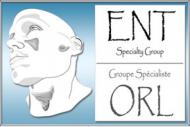The ENT Specialty Group offers expertise in the diagnosis and treatment of a variety of hearing and balance disorders. These include:
– Cerumen (wax) removal
– Presbycusis (age-related), sudden & noise-induced sensorineural hearing loss
– Conductive hearing loss (otosclerosis, tympanic membrane perforations)
– Chronic otitis (ear infections, cholesteatoma)
– Eustachian tube dysfunction
– Tinnitus
– Vertigo / dizziness (Meniere’s disease, BPPV, acoustic neuromas)
– Facial nerve disorders (Bell’s palsy)
– Expertise for CNESST (CSST) cases involving occupational noise exposure
Consultation is provided by Fellowship-trained Otologists, as well as other Otolaryngologists with an interest in disorders of the external, middle and inner ear.
Referrals can be made to see an on-site Audiologist to perform audiograms (hearing tests) and impedance tympanometry (to test Eustachian tube function).
There is also an experienced Physiotherapist who is specially-trained for vestibular rehabilitation (including Epley maneuvers).



